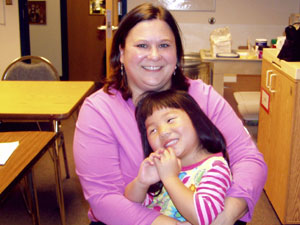|
Audio
Photos
More from MPR
Resources
|
St. Paul, Minn. — Soft cheers are the greeting for a group of young children and their parents who convene every Tuesday evening at the Eastside Community Center in St. Paul. The class is one of many early childhood education classes offered by the St. Paul Public Schools. What sets this class apart from the others is that all of the children here are adopted.
Jackie Sticha attends the Families with Adopted Children classes with her four-year-old daughter, Lily. She says one of the reasons she signed up for the class was to meet other families with adopted children. But Sticha says there was another reason to bring Lily to class every week.
"I wanted her to see other families that looked like us so she had a feeling that look was a regular part of life, so that it felt normal to her," Sticha says.
Sticha, a single mom, adopted Lily from China, when she was 11 months old. She's been coming to the adoptive families class for the last three years.
"I stay to find out how I can help her integrate some of the things, some of the hurt and pain she has from the transition to our family," she says. "I stay here to learn how to do that better and to meet other families who are doing it well and to learn from them."
Sticha is not alone. Dozens of families have taken the nine-month course over the last few years. Donald Sysyn, who oversees St. Paul's state-funded early childhood education programs, says it's important to isolate certain types of families in special classes to help parents focus on why they're there.
"They don't have to explain their story because everyone else in the group already knows it and is there. So they can build on that and build on that support. Where, if they're in a group that is more mixed group, they feel like they're always explaining and have to education the other parents on what it's really like to have a child with special needs or what it is really like to have adopted a child from a different country. So it's kind of like they're all on the same page when we break it out and have a homogeneous group like that," according to Sysyn.
The classes are set up to provide family time. Children and their parents can paint, work on arts and crafts projects or play with a number of toys and costumes. On a recent night, there was a tub of corn kernels that kept several families busy.
But there's also time set aside for parents to learn about child-raising strategies and child development with each other and a parent educator. They talk about grief, loss and attachment.
Paul and Andrea Winghart adopted two brothers from Russia last year. Andrea Winghart says she worried about "attachment" issues with her two- and three-year-old sons.
"Coming from an orphanage setting where they don't necessarily have a steady care-giver or have been in foster care, there's a lot of concerns with whether or not they'll learn to trust you because of the fact that they've probably had rotating care-givers throughout their lives so they've never really attached to anybody. So for them to learn to trust us and attach to us is a big thing," she says.
The classes cover other issues as well. Since the number of international adoptions has increased, there are also discussions on keeping cultural identities and how to build family traditions. And parents can bring their own concerns to class to help sort out any issues they may be having with their child -- like whether a problem is related to the fact that a child is adopted -- or related to the fact that the child -- is just a child.
"The first year, I think went home almost every night almost crying, thinking I was the worst parent on the planet because I saw other parents who had been doing it longer," recalls Jackie Sticha. "And I was like, 'Oh, my God, I'm going to so screw up this child.' And now the second and third years I definitely have times when I think, 'wow, I'm doing this and that's really good.'"





